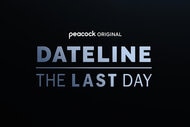Create a free profile to get unlimited access to exclusive videos, breaking news, sweepstakes, and more!
How To Use CIA Techniques To Avoid Surveillance and Improve Your Dating Life
Former CIA technical operations officer Luke Bencie spoke to CrimeCon 2022 attendees about the tricks of the spycraft trade and how you can use the CIA's knowledge to improve your dating life, avoid surveillance or just learn more about your neighbors.
The secrets of the CIA, former technical operations officer Luke Bencie told attendees at CrimeCon 2022, can do more than protect the national security of the United States.
Bencie, now an author and security consultant, explained that, in fact, the techniques that CIA officers use to collect intelligence, recruit assets and protect themselves from surveillance are applicable to our everyday lives ... and we ought to start applying them.
"People don’t realize ... how much regular people … are spied upon when they’re overseas," he told the audience on Friday evening in Las Vegas.
But, beyond the risks to business travelers, scientists and other people with information that might be of use to foreign powers, Bencie noted that many situations in which we find ourselves, whether it's dating, strange neighbors or just trying to close a business deal involves — or can involve — the use of human intelligence.
The CIA uses a framework called CARVER, an acronym that stands for Criticality, Accessibility, Recoverability, Vulnerability, Effect and Recognizability.
When applied to people from whom they're seeking intelligence — as opposed to physical targets — it instructs officers to assess how important a particular person is to your mission, whether they can actually get you what you want, the downside if you fail, how likely they are to accede to your demands, the repercussions of being involved with the person, and how obvious it is to you and others that they are "gettable."
Bencie noted that this works for all kinds of situations — including online dating, where the people you might come across are complete unknowns. But, he said, applying the system requires that you know what your mission is!
If, in the intelligence community, you identify a valuable person with whom you want to develop an ongoing relationship, recruiters are also taught about the life cycle of an asset – in which they identify them, assess them (using CARVER) and develop the relationship – all before they begin recruitment. Once successful, they need to learn to handle the person they recruited and be prepared to successfully terminate the relationship without ill effects.
The applicability of this framework to other relationships, said Bencie, might be more obvious.
However, if one is only trying to extract information out of someone during a conversation — which CIA officers call "elicitation" — the key thing to understand is why any given person might give that information to you. And while, in the Cold War era, recruiters believed that people would give information up for money, ideological reasons, coercion or to feed their own egos, Bencie said that Harvard professor Dr. Robert Cialdini came up with a new framework for the modern day.
Known by its acronym, RASCALS, it suggests that, in the 2020s, people are motivated to give us information (or other things we want) for reciprocity, out of a sense of authority, for social proof, commitment, to be liked or out of a sense of scarcity.
In the end, getting what you want from others, Bencie said, is often a matter of using time-tested sales techniques to build rapport: assess their needs, wants, wounds, access, and money. Then employ what he called SCREAMPIGS: smile, compliment, referral (bond over a thing in common), exhibit (who you are), ask (about them), (leave) mystery (about yourself), poll, (get) information, (give) gifts and schedule (a follow up).
But, he added, you should know the techniques to use them as much as to recognize when they're being used on you. He suggests people note when others are mirroring your physical movements, when there are holes in their stories or incongruent behaviors, when they talk up their credentials or — in the case of Americans — overuse the words "because" or "just."
Intelligence, he said, is more of an art than a science but that doesn't mean you have to trust your gut over your brain ... even when talking to your neighbors.
CrimeCon 2022 is produced by Red Seat Ventures and presented by Oxygen.





























